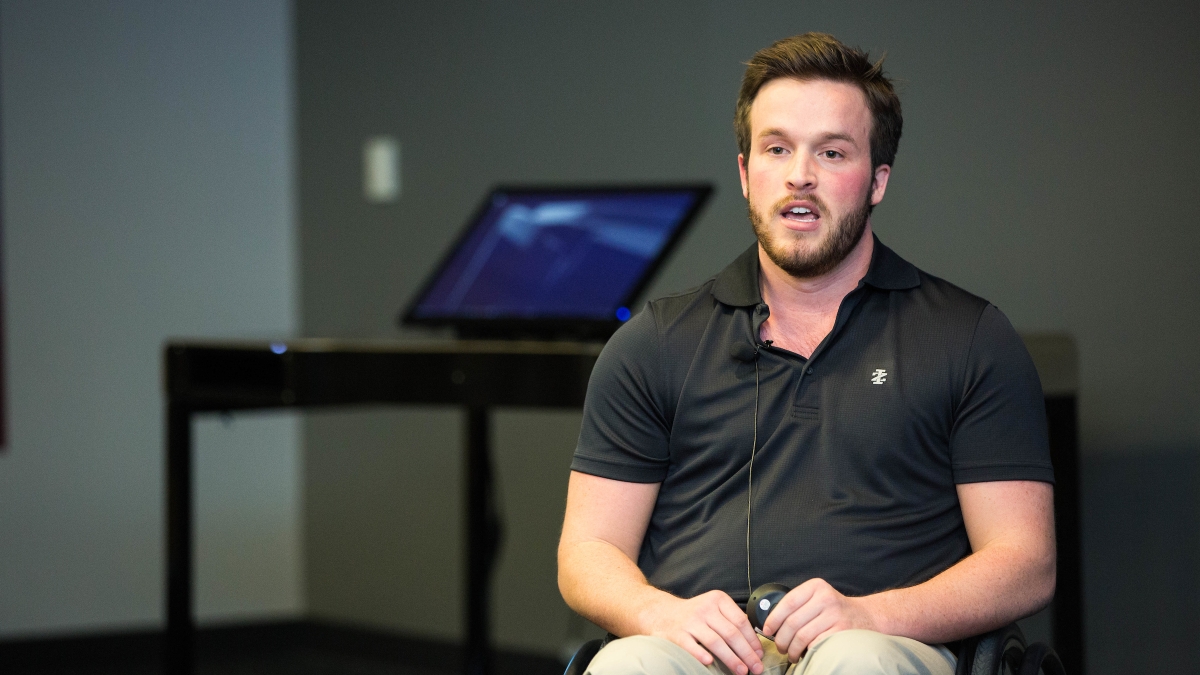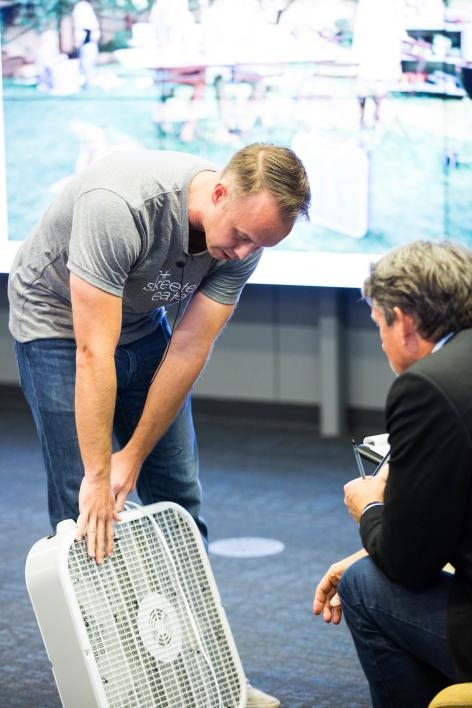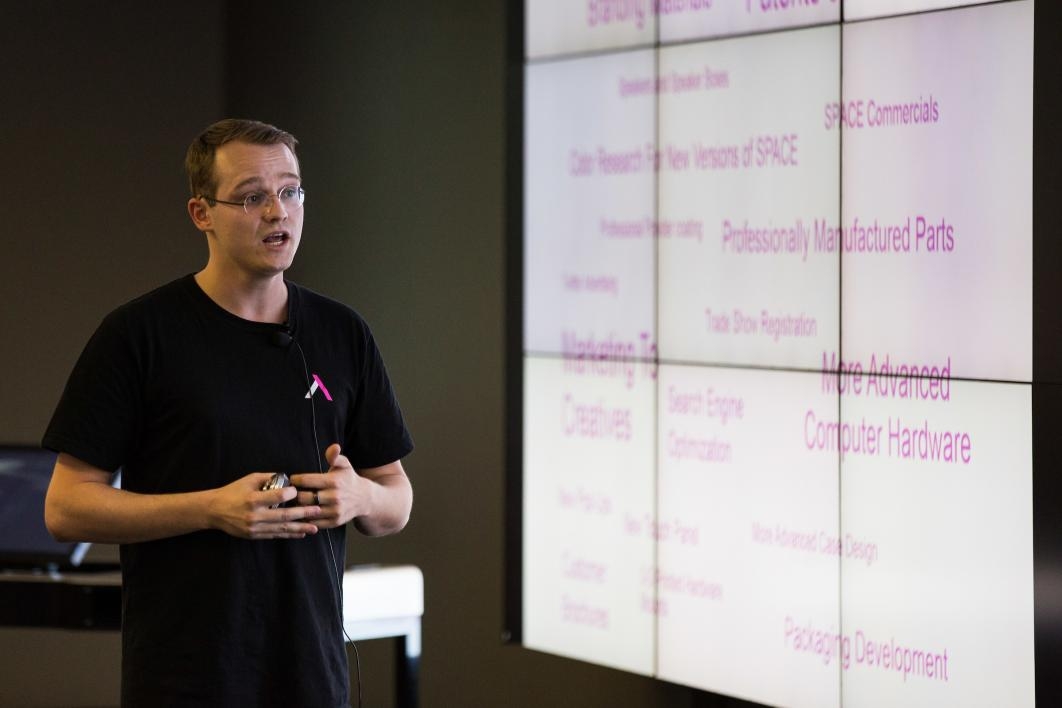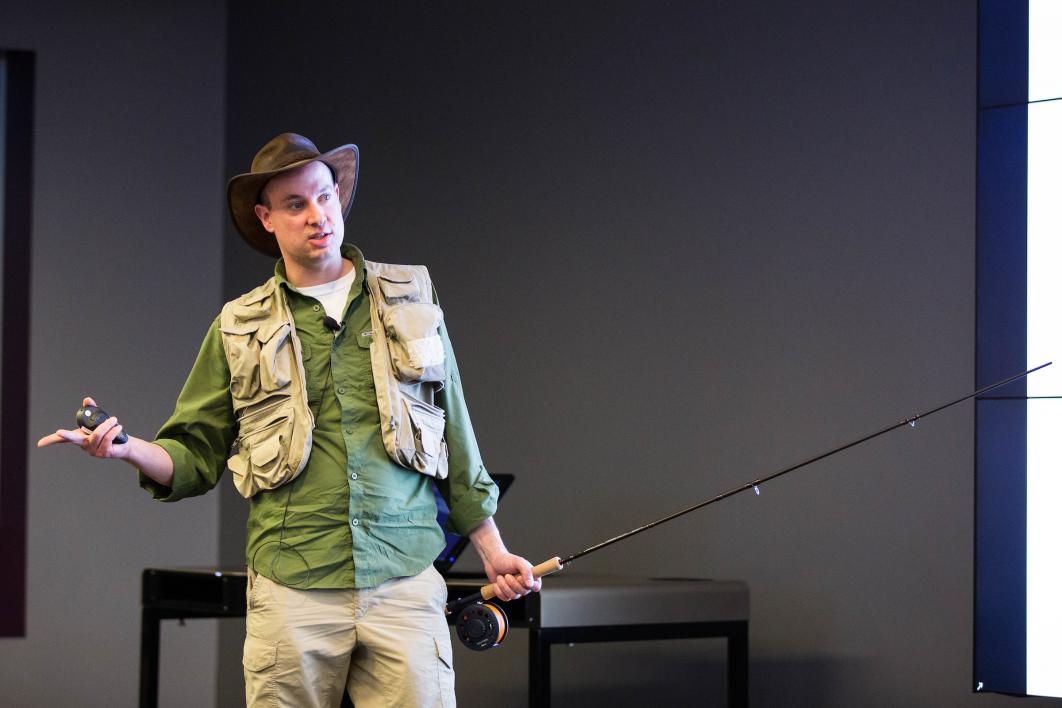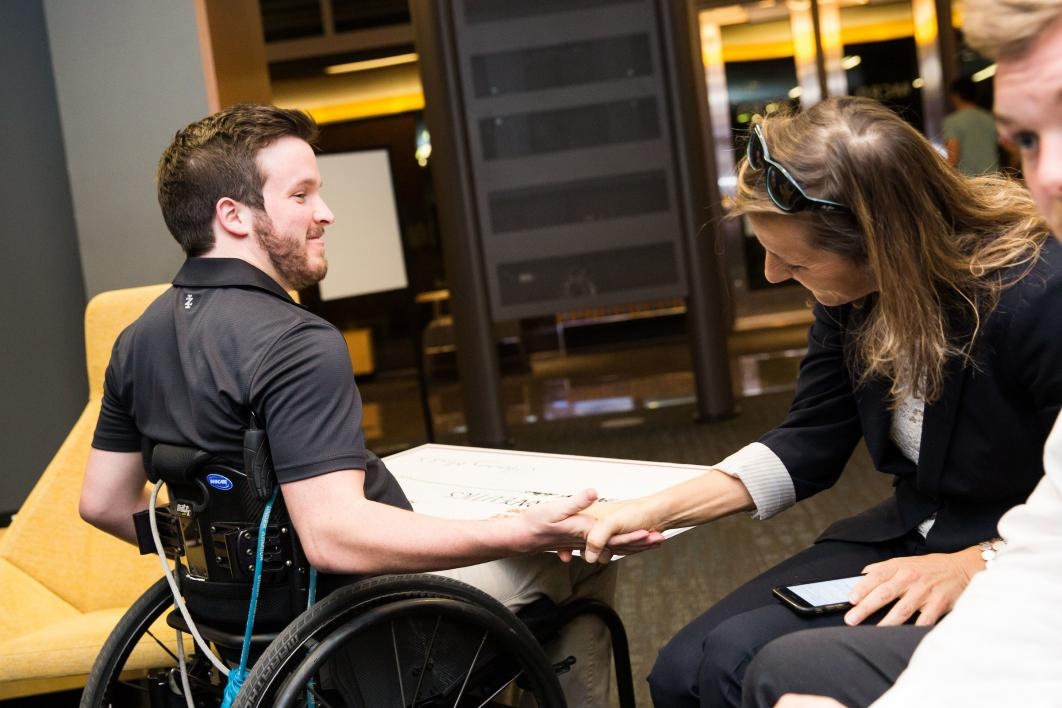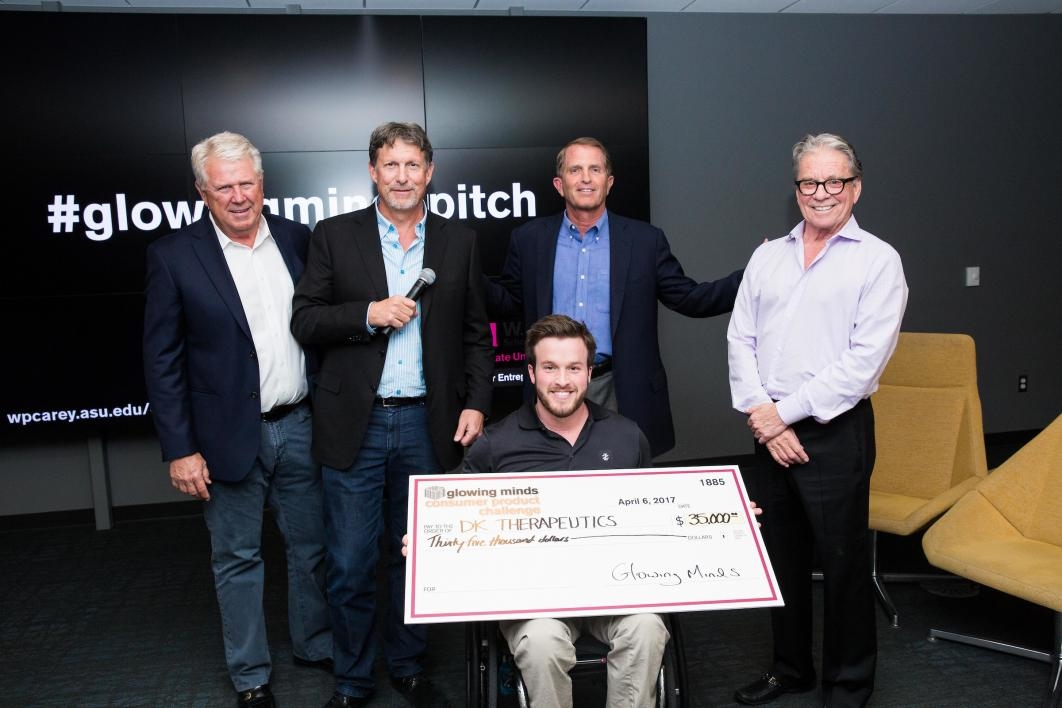An Arizona State University student has won $35,000 for inventing a therapy device that could change his life and help thousands of people who can’t walk.
Dan Campbell, a robotics engineering major at ASU’s Polytechnic campus, invented AmbulAid to help people with neurological damage — like himself. Campbell, who was paralyzed from the chest down in a wrestling accident five years ago, uses a wheelchair.
He beat three other student-led entrepreneurial teams in the first ever Glowing Minds Consumer Product Challenge on Thursday at ASU's Tempe campus. Another team, called Shockingly Simple, won $10,000 for its invention — the Skeeter Eater, a non-chemical pest-control device.
Campbell said he invented the AmbulAid because nothing like it exists. The invention, a system of straps and supports, is used with a physical therapist in conjunction with a treadmill to help patients with “gait training” — essentially simulated walking. Gait training is important for people who have paralysis because it prevents osteoporosis, increases blood flow and, most importantly, can create neural connections between the muscles and the brain, sometimes leading to improved sensation and muscle use.
Campbell showed a video of himself using a sophisticated robotic exoskeleton gait trainer during his initial therapy after his injury. But those devices are expensive and rare. When he left the state-of-the-art facility for a regular clinic, his progress reversed.
“The day you’re discharged from therapy is typically the day your recovery ends,” he said. “For a lot of people that means losing sleep for the rest of your life wondering if your body’s potential to heal was actually reached.”
So he partnered with a doctor of physical therapy to launch his business, DK Therapeutics, and to create AmbulAid.
“Now I’m ready to bring it to millions of others who desperately need it,” he said.
He has a patent pending on the device and plans to sell it for about $2,000.
The panel of four judges, all longtime entrepreneurs, were impressed with Campbell’s simple design and well-executed business plan.
“The reason we got involved in putting this on was to try to bring out this entrepreneurial spirit in people. You’re living this nightmare and you’re making it into a dream,” said David Watson, who was a co-founder of the Philosophy line of skin-care products and founded Revolution Tea. He donated the prize money to the competition, which was sponsored by the Center for Entrepreneurship in the W. P. Carey School of Business.
“You are what this product represents, and I think being first to market will be gigantic.”
Campbell said even with high education, fewer than half of people resume working after a spinal-cord injury, so he would like to hire people with spinal injuries to be his sales force.
“They will carry on my advantage of belonging in the user group and being emotionally invested in the product,” he said.
Eventually he would like to integrate functional electronic stimulation in the AmbulAid, a process that uses electrical impulses to facilitate muscle movement.
“But that will need years of development, and I want to get this to market fast because there’s a glaring need for it,” Campbell said.
Video by Deanna Dent/ASU Now
Michael Court, an MBA student and a founder of Shockingly Simple, said he thought of the Skeeter Eater after facing a mosquito problem at his house.
“I did some research, and I found out that mosquitoes are weak fliers. They can’t stand even a small breeze. There’s no product that exploits this right now,” he said.
The Skeeter Eater, which looks like a typical box fan, incorporates an electric grid inside it.
“A mosquito flies by and gets sucked into the intake, gets plastered into our electric grid and boom! It’s dead,” he said.
Court said the team plans to sell the device on its website, as well as Amazon and eBay, for $50 to $100.
Terry Lee, one of the judges, said he loved the idea and thought it would make a great infomercial product.
“Everyone wants to solve their mosquito problem, and everyone hates chemicals,” he said.
Court said the team is considering a one-for-one business model, like Tom’s Shoes, where the retail price pays for one device for the consumer and another for a country that is dealing with mosquito-borne diseases.
The other two finalist teams were M33 Labs, which created a “smart desk,” and Epic Creek, which developed a fly-fishing kit.
Brandon Smith, a technological entrepreneurship major at the Polytechnic campus, said M33 Labs wanted its product, Space, a high-technology desk with integrated hardware and high-density touch-screen display, to be beautiful as well as functional.
“We thought, what if we could take a computer and could pack all the power and all the functionality that a designer or engineer would need into one beautiful, unified package that would be ready to go out of the box?” said Smith, who is CEO of M33 Labs.
The company hopes to sell Space for $3,500, or $4,500 for a version for high-end design and animation professionals.
Jeff Ward, a technological entrepreneurship major and founder of Epic Creek, is a fly fisherman and decided to invent a streamlined system for using and buying flies. The box would hold cards of flies that are interchangeable and customized.
“You need a lot of equipment for fly fishing. You need different flies for different species of fish for different seasons and for different streams. And you need something to put those flies in,” he said.
He is hoping to crowd-source the expertise to determine each set of flies and will distribute prototypes to celebrity fishermen.
“There are a lot of anglers who are avid. They want to preach, ‘This is what works,’ ” he said.
Top photo: Dan Campbell, a robotics engineering major at the Polytechnic campus, pitched his idea for AmbulAid during the Glowing Minds Consumer Product Challenge on Thursday. He won $35,000. Photo by Deanna Dent/ASU Now
More Health and medicine

College of Health Solutions alumnus named Military Medic of the Year
By Keri Hensley and Kimberly LinnJonathan Lu has looked out for the health of his fellow military service members his whole career, starting with his role as a combat medic in the U.S. Army.Driven by…

ASU, Mayo Clinic forge new health innovation program
Arizona State University is on a mission to drive innovations that will help people lead healthier lives and empower health care professionals to develop novel new health solutions. As part of that…

Innovative, fast-moving ventures emerge from Mayo Clinic and ASU summer residency program
By Georgann YaraIn a batting cage transformed into a custom pitching lab, tricked out with the latest in sports technology, Charles Leddon and his Mayo Clinic research teammates scrutinize the…
